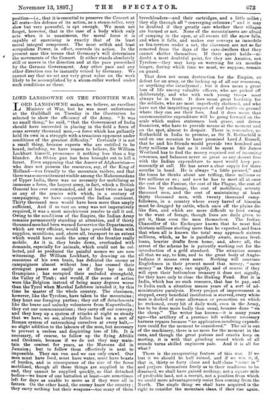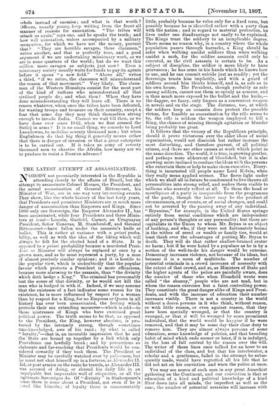LORD LANSDOWNE ON THE FRONTIER WAR.
TOED LANSDOWNE makes, we believe, an excellent 41 Minister of War, but he was most unfortunate at the Guildhall on Tuesday in the illustration he selected to show the efficiency of the Army. "It was no small thing," he said, "that the Government of India should have succeeded in placing in the field a force of some seventy thousand men,—a force which has gallantly held its own in a struggle with a tenacious opponent under conditions of the greatest difficulty." Certainly it is not a small thing, because experts who are entitled to be heard, including, we have reason to believe, Sir William Lockhart himself, pronounce it nothing less than a big blunder. An 80-ton gun has been brought out to kill a ferret. Even supposing that the Ameer of Afghanistan— who does not possess the resources, say, of the King of Holland—was friendly to the mountain raiders, and that there was some excitement visible among the Mahommedans of Upper India, there was no necessity for mobilising so immense a force, the largest army, in fact, which a British General has ever commanded, and at least twice as large as any of the armies with which, in a century of campaigning, we have conquered the Indian continent. Thirty thousand men would have been more than amply sufficient, And if so vast an army was not imperatively required, it was a most mischievous resolve to call it out. Owing to the conditions of the Empire, the Indian Army remains permanently standing at attention, and if thirty thousandmen had been warned forservice the Departments, which are very efficient, would have provided them with supplies, munitions, and, above all, transport to an extent which would have made the army of the frontier really mobile. As it is, they broke down, overloaded with demands, especially for animals, which could not be col- lected, and so produced the painful scenes we are now witnessing. Sir William Lockhart, by drawing on the resources of his own brain, has defeated the enemy as campaigners almost without loss ; has crossed their strongest passes as easily as if they lay in the Grampians ; has occupied their secluded stronghold, the Valley of Tirah ; and would, if the scene of action were like Belgium instead of being many degrees worse than the Tyrol when Marshal Lefebvre invaded it, by this time be master of the whole country. The clansmen, however, like the Tyrolese, have taken to the mountains ; they hunt our foraging parties; they cut off detachments like the brave and unlucky volunteers from Kupurtholla, ; they cut our communications ; they carry off our convoys; and they keep up a system of attacks at night so steady that we have, we see, already fallen back on a sort of Roman system of entrenching ourselves at every halt,— no slight addition to the labours of the men, but necessary to prevent a useless and dispiriting loss of life. It is necessary, of course, to follow up the flying .Afridis and Orokzais, because if we do not they may main- tain the contest for years, as the Maroons did in Jamaica ; but to follow them effectively is next to impossible. They can run and we can only crawl. Our men must have food, must have water, must have beasts of burden, and in consequence of the size of the force mobilised, though all these things are supplied in the end, they cannot be supplied quickly, so that detached bodies—we know of one battalion at least—are sometimes left for days as unable to move as if they were all in fetters. On the other hand, the enemy know the country ; they carry nothing but their weapons—too many of them breechloaders—and their cartridges, and a little millet ; they slip through all "converging columns ; " and it may be doubted if they greatly care whether their villages are burned or not. None of the mountaineers are afraid of camping in the open, at all events till the snow falls, and when it falls, and makes our convoys as immobile as fox-terriers under a net, the clansmen are not so far removed from the days of the cave-dwellers that they cannot shelter themselves. If their spirit holds—no doubt a most doubtful point, for they are Asiatics, not Tyrolese—they may keep on worrying for six months longer, during which time we must, we suppose, remain on guard.
That does not mean destruction for the Empire, or defeat for an army, or the locking up of all our resources, or anything else cataclysmal; but it does mean a great loss of life among valuable officers, who are picked off deliberately, and who with such young troop. must always be in front. It does mean great hardship for the soldiers, who are most imperfectly sheltered, and who have not the inspiriting prospect of real battle on ground where they can see their foes. And it does wean that unremunerative expenditure will be going forward on the scale which makes statesmen look grave, and drives financiers, who have to provide means at the moment and on the spot, almost to despair. There is, remember, no Rothschild in India to promise, as Sir N. Rothschild is said on one occasion to have promised Lord J. Russell, that he and his friends would provide two hundred and forty millions as fast as it could be spent. Sir James Westland has to find the money required out of incoming revenues, and balances never so great as any decent firm with the Indian expenditure to meet would keep per- manently at call. He has never a clear supply for three months in hand. He is always "a little pressed," and the loans he thinks about are trifling, three millions or five millions or so ; and now he has to meet all at once the cost of the Famine, the cost of the Plague, the cost of the loss by exchange, the cost of mobilising seventy thousand men, and the cost of maintaining at least thirty thousand men, with twenty thousand camp- followers, in a, country where every barrel of biscuits must be dragged by cattle, which once off the plains die like flies, and which are more difficult to feed owing to the want of forage, though lives are daily given to get it, than even the men themselves. The Indian Chancellor of the Exchequer knows that he must find thirteen millions sterling more than he expected, and feats that when all is known the total may approach sixteen millions, which, as he is painfully aware, means fresh loans, heavier drafts from home, and, above all, the arrest of the scheme he is patiently working out for the introduction of a gold standard. The situation means all that we say, to him, and to the great body of Anglo- Indians it means even more. Nothing will convince Englishmen in their present mood that money, " mere money " as they say, can signify, and of course if they will open their bottomless treasury it does not signify, for they have only to close the Sinking Fund. But it is India, which has no such resource, that has to pay, and to India such a situation means years of a sort of ad- ministrative paralysis. Every project of improvement is stopped, every beneficial institution is starved, every white man is docked of some allowance or promotion on which, he reckoned, every bit of daily work, even in the Army, has to be done more badly than usual, because done "on the cheap." The writer has known—it is many years ago—the artillery of a province left without necessary harness repairs because "no application involving expendi- ture could for the moment be considered." The oil is out of the machinery, there is no more for the moment in the cans, and though the great pistons and cranks keep on moving, it is with that grinding sound which of all sounds turns skilled engineers pale. And it is all for what ?
There is the exasperating feature of this war. If we lost it we should be half ruined, and if we win it, if, that is, thirty or forty clans and half-clans "come in " and perjure themselves freely as to their readiness to be disarmed, we shall have gained nothing; not a square mile of profitable land, not a recruit, not a position from which we could more advantageously resist foes coming from the North. The single thing we shall have acquired is the right to consider the mountain clans, if they rise again, rebels instead of enemies; and what is that worth ? Officers, usually young, keep writing from the front all manner of reasons for annexation. "The tribes will attack us again," says one, and he speaks the truth ; and how will annexation, unless accompanied by a military occupation, for which we have not the money, prevent that ? "They are horrible savages, these clansmen," writes another, and that is perfectly true, and a good argument if we are undertaking missionary work, as we are in some quarters of the world ; but do we want this million more savages as subjects just now? Even a missionary society usually waits for funds to pay its agents before it opens "a new field." "Above all," writes a third, "if we retire, the clansmen will misunderstand the reason of that movement." Very likely. The clans- men of the Western Himalaya consist for the most part of the kind of ruffians who misunderstand all that civilised people do ; and what then? When they have done misunderstanding they will leave off. There is no reason whatever, when once the tribes have been defeated, for wasting troops and treasure on their country, except a fear that some day they may think themselves strong enough to invade India. Cannot we wait till then, as we have done ever since 1842, when we first crossed the Sutlej in arms ? It is no small thing, we concede to Lord Lansdowne, to mobilise seventy thousand men ; but when Englishmen do that big thing it generally means either that there is danger of invasion or that a great enterprise is to be carried out. If it takes an army of seventy thousand men to chastise the Afridis, how-many are we to produce to resist a Russian advance?







































 Previous page
Previous page